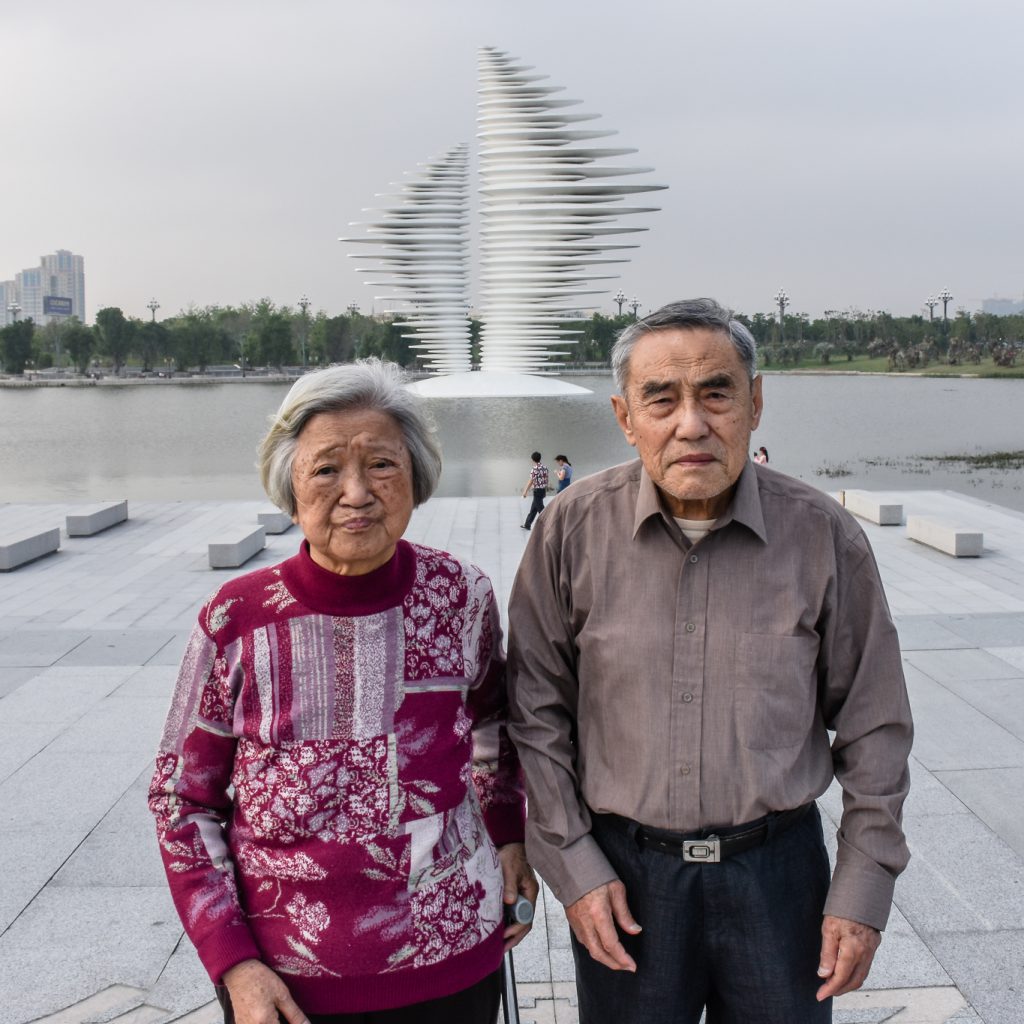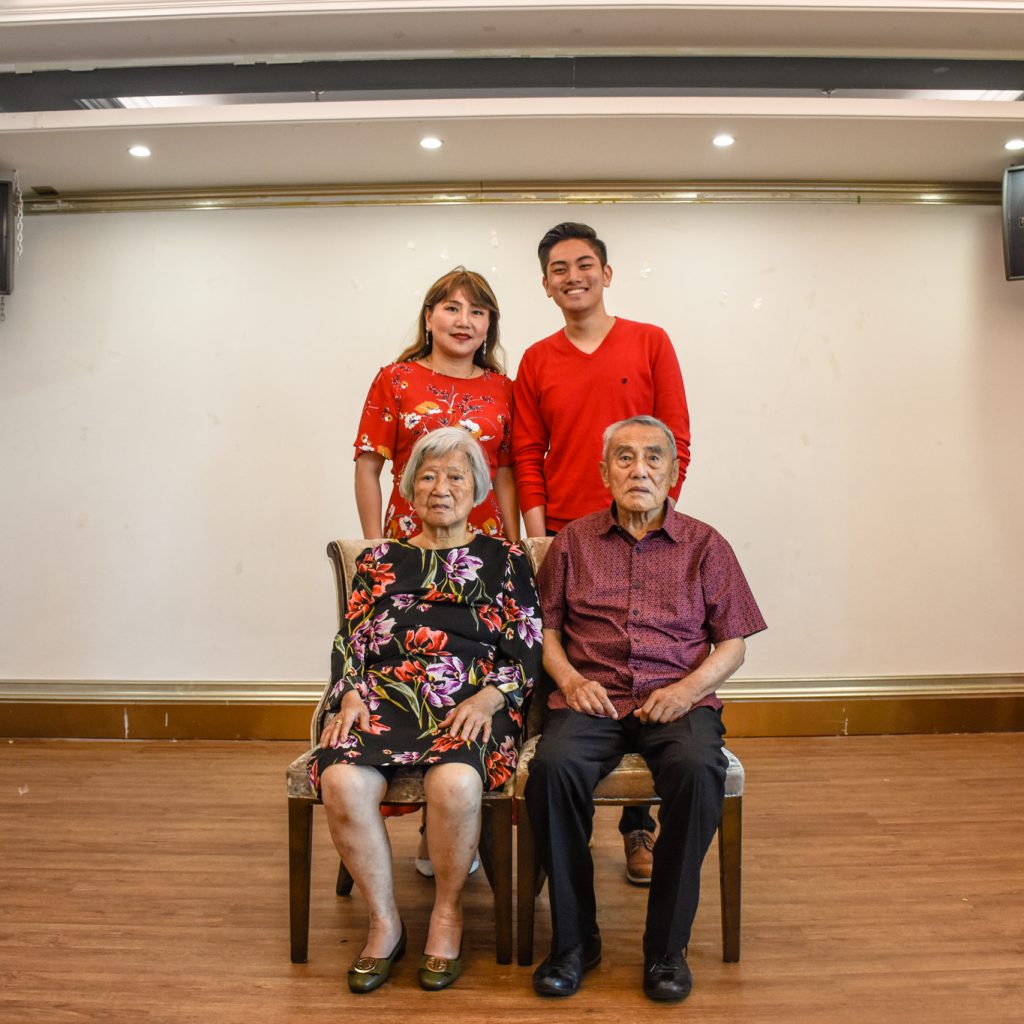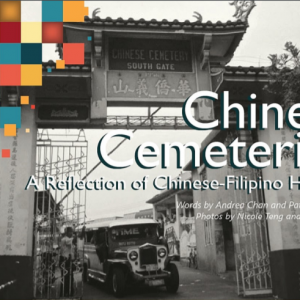Words and Photos by Adrian Jesper Cea
A feast greeted me on the second night of my maternal grandmother’s wake. My dad and I arrived at the airport of Jinjiang, China, from Manila by early afternoon last July; by nightfall, we reached my mom’s old house, where the coffin lay. Tents were propped up on the two intersecting roads bordering the house. Numerous dining tables were set up below them, and platters of food were constantly served from the neighbor’s kitchen. The place buzzed with incessant chatter and the whirring of large industrial fans.
Amidst all the noise outside, I peered past the rusty gate of the front yard. I glanced past the porch, the potted plants, and the two metal doors, before my gaze finally settled on the brightly-lit living room. There, the coffin rested: elegantly covered with a mass of green leaves and dainty white flowers. A picture of my grandmother hung on the wall behind the coffin. And before it, stood my mom and her siblings, weeping. It was then that I realized the complexities of grief. Their grief. It was something that I probably would never comprehend–not in a lifetime.
It’s not as if I never got the chance to meet my grandmother. My mom was born and raised in mainland China. Every year or so, my mom would drag my sister and I along to visit during summer breaks. We would spend the next few weeks embracing the culture and desperately trying to utter the proper Chinese honorific term for each relative we barely recognized. For instance, I call my grandmother gua-ma.
Gua-ma was a rather grumpy woman. A picky eater, too–but oh, did she love peanuts and sweet taro, which was unfortunate as she had diabetes. She’d sneak a bite or two during dinners though, when we weren’t looking. She was also exceptionally good in math–especially in counting money, and she’d hide stashes of bills somewhere in her room. For safekeeping, as she used to say.
Gua-kong and gua-ma were the perfect K-drama couple, I dare say. They would sit on the couch together, and while she watched TV, he read the newspaper. While engaging in their activities, gua-ma would complain about the pain in her leg, and gua-kong would massage it with his shaky and wrinkly hands.
Apart from these observations, I never really got to talk to her that much. Every year it was always a simple greeting, an invitation to eat, or an exclamation about how much I have changed, as if we haven’t met every year since I was ten.
I was not accustomed to how close grandparents could be to their grandchildren, as I grew up in such a manner. Maybe it was my poor proficiency in Chinese or just my sheer shyness, but whatever the cause, I could just never seem to start a conversation with my grandparents. Sometimes I dismissed it as an Asian thing–more specifically, a Chinese thing: that we are just relatively inexpressive, from grandparents to grandchildren. That is, until met with the most overpowering emotions.
After changing into the white robes especially reserved for funerals, I saw gua-kong sitting on a stool by the porch, gripping his cane in one hand. To keep himself busy, he nibbled on a toothpick while guarding our bags. With puffy eyes, he’d stand up and shuffle a few inches from his seat to welcome visitors and relatives. Then he’d sit silently again.
The next morning, we got up early to prepare for the funeral procession. Once again, we donned the white robes, still soaked with sweat from the night before; a white hat; and a piece of red cloth which we tied around our waists. There were even more people now around the house. Ceremonies were done inside, led by monks who had memorized all Chinese traditions and Buddhist prayers by heart. Some, like me, just went with the flow–bowing when they bowed, kneeling when they kneeled, chanting when they chanted.
As we were getting ready outside, I heard crying from behind me. I turned and saw my mom and her five siblings sobbing hysterically before rushing to an open truck where the coffin was being loaded. The coffin was now wrapped in red cloth, and an enormous papier-mâché of what looked like a peacock or a dragon was placed on top. I saw their contorted faces glinting with sweat and tears against the harsh light of the midday sun. I listened to their wails drown out the music playing over the truck’s speaker.
The procession was a five-kilometer walk going to and from the cemetery, and it was carried out under the scorching sun. The grandsons, including myself, were instructed to carry a palanquin throughout the whole procession. A palanquin is a carriage box that the nobility of Ancient China used as a means for transportation. The carriage is suspended on a base of wooden poles held and uplifted horizontally by bearers. Ours was fairly light, as it was made from a bunch of colored papers assembled together with wooden sticks.
A smaller picture of gua-ma was placed inside it when we reached the cemetery. As we limped back to the house still carrying the palanquin, I looked at her image and she seemed to look back at me.
I was distant from my family–separated by miles of a highly-disputed sea, a lack of awareness of my inherent culture, and a timid disposition. Throughout the whole ordeal, I never shed a tear. It felt wrong. Even when I forced myself to, I could not cry. Despite this, I found peace in carrying the palanquin–as if I was dutifully carrying what remained of gua-ma‘s presence in this world back to her home, the place where it all began.
Maybe it really wasn’t my responsibility to grieve her loss. It was not for a lack of apathy, however. Rather, it was because I had to reconcile the fact that what sliver of a chance I could have had to get to know her better was now gone; and I had to learn to accept that.
I realized that as much as I was a part of the family, I was also the guest. In as much as grief is universal, being incapable of feeling it is also possible. And it’s not necessarily a bad thing. Perhaps only sad.
At one point in time, we will all assist grievers, though I wouldn’t call it “sympathy” as there is really no way of understanding lamentation in the first place. It won’t be the same for every person, as they mourn for different reasons.Their lives were touched by the deceased in different ways as well–even more so for the guest. He had just stumbled upon the grieving affair and thus, could not provide solace to the mourners. But he could listen to their anecdotes, marvel at the love they received and gave, and to the ways they remembered the one who’s gone before.
Everyone was exhausted by the time we finally got back to the house. We laid down palanquin below the tents, and my uncle took over the preparations for gua-ma’s picture frame. The simplest thing I could do in her memory was done. But I wasn’t satisfied; I knew I could do other things.
Gua-kong was still sitting in his chair. He didn’t come with us for the procession as his legs were weak, although I could see in his eyes how much he wanted to. A car was waiting at the gates to drive him to the nearby hotel. I approached him, slightly nodding as he saw me, and he nodded back. He knew it was time to leave. I supported him by the elbows as he stood up, and together, we walked out the front gates.






